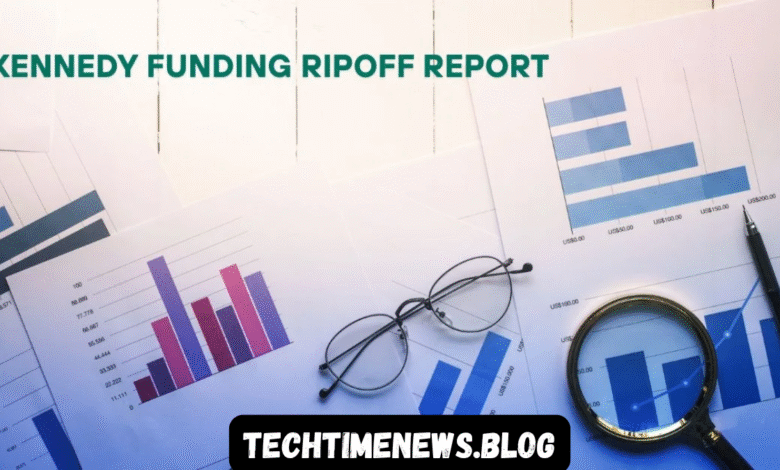Kennedy Funding Ripoff Report

Kennedy Funding Ripoff Report has been a notable name in the commercial real estate financing sector for several decades often specializing in unconventional or hard-money loans. The company’s reputation has been built on its willingness to take on deals that traditional lenders might refuse due to the complexity of the project, the risk involved, or the borrower’s unique circumstances. However, as with many financial service providers in the alternative lending sector, Kennedy Funding has also faced scrutiny, and one of the focal points of this scrutiny comes from sources such as the Ripoff Report. The term “Kennedy Funding Ripoff Report” has circulated in various discussions, bringing attention to complaints, disputes, and differing opinions about the company’s practices.
Understanding the Ripoff Report Platform
Before examining the specifics of the Kennedy Funding Ripoff Report, it is important to understand what the Ripoff Report is and how it functions. The Ripoff Report is an online consumer complaint website where individuals can post allegations about companies or individuals. These reports can cover a range of grievances, from customer service dissatisfaction to claims of unethical or even fraudulent practices. The platform’s policy allows the reports to remain public and searchable indefinitely, and they are rarely removed even if the disputes are resolved privately. This permanence gives the Ripoff Report significant influence over public perception.
In the case of Kennedy Funding, reports on the platform have been a point of contention. Some borrowers have claimed that their experiences were not in line with the promises made during the lending process, while others have defended the company, noting that alternative financing naturally comes with higher costs, stricter terms, and certain risks that borrowers must be aware of.
The Nature of Alternative Financing
Kennedy Funding operates in a segment of the financial industry that deals with borrowers who may not qualify for conventional bank loans. This can include projects with complicated legal backgrounds, properties in unique locations, or situations where time is a critical factor. In such cases, alternative lenders often step in to fill the gap. They offer quicker turnaround times and more flexible underwriting processes, but these benefits usually come with higher interest rates, fees, and collateral requirements.
Borrowers unfamiliar with the dynamics of hard-money lending may enter agreements expecting terms similar to those from banks. When the reality involves higher costs or stricter enforcement of repayment schedules, dissatisfaction can arise. Some of the Ripoff Report entries related to Kennedy Funding reflect this misunderstanding between the borrower’s expectations and the lender’s business model.
Common Themes in Complaints
The Kennedy Funding Ripoff Report entries often revolve around several recurring themes. Some reports allege that the company’s fee structures were not transparent, leading to higher-than-anticipated costs. Others focus on the loan approval process, claiming that initial assurances did not translate into finalized funding. There are also grievances about the handling of collateral, especially in cases where borrowers defaulted and the lender took possession of the property.
It is worth noting that in commercial lending, particularly in high-risk transactions, lenders protect themselves through stringent contract clauses. From the lender’s perspective, these clauses are necessary to mitigate the risk of significant financial loss. From the borrower’s perspective, however, these same clauses can appear aggressive or unfair when enforced.
Differing Perspectives on the Ripoff Reports
While negative reports draw attention, they do not necessarily paint a full picture of a company’s operations. Kennedy Funding, like many in its sector, may have hundreds of successful transactions for every disputed one. Satisfied clients often do not post online reviews, whereas those who feel wronged are more motivated to share their experiences publicly. This creates an imbalance in the representation of customer sentiment.
Furthermore, some Ripoff Reports can be posted by competitors or by individuals with grievances unrelated to the actual lending process. The open nature of the platform means that reports are not verified in the way that formal legal complaints are. Thus, while the Ripoff Report can be a valuable tool for potential clients to research a company, it should be weighed alongside other sources of information such as verified testimonials, Better Business Bureau ratings, and industry references.
The Legal and Ethical Dimensions
When a company like Kennedy Funding faces allegations on a public platform, it often has limited recourse due to free speech protections. This can make it challenging for businesses to fully address the claims or have them removed. However, the presence of these reports can influence potential borrowers’ decisions, affecting the company’s reputation and bottom line.
Ethically, businesses have a responsibility to ensure their clients fully understand the terms of any agreement before signing. In the world of alternative financing, this includes being clear about fees, repayment expectations, and potential risks. Borrowers, on the other hand, bear the responsibility of conducting due diligence, reading contracts carefully, and seeking legal advice if necessary.
The Role of Contracts in Disputes
Many disputes that end up as Ripoff Reports stem from misunderstandings or disagreements over contract terms. Commercial lending contracts, particularly in high-risk scenarios, are often complex and filled with legal jargon. This complexity can lead to situations where borrowers sign agreements without fully grasping the implications.
In Kennedy Funding’s case, the contracts are likely designed to protect the company’s investment while providing the borrower with access to capital. Provisions related to default, collateral seizure, and repayment penalties may seem harsh, but they are standard in the industry to ensure that lenders are compensated for the elevated risk they undertake. Disputes can arise when borrowers feel these provisions were not adequately explained or when unexpected circumstances make compliance difficult.
Balancing Risk and Reward
From a business perspective, Kennedy Funding’s willingness to take on high-risk loans offers opportunities for projects that might otherwise be abandoned. Developers with unconventional visions or urgent financial needs may find in Kennedy Funding a partner willing to provide funding when others will not. This can lead to successful projects that benefit communities and generate significant returns for all parties involved.
However, the same risk that enables these opportunities also sets the stage for potential disputes. When a project fails or a borrower cannot meet repayment obligations, the outcome is rarely pleasant. These failures, and the enforcement actions that follow, are often the subject of Ripoff Report entries.
Media Influence and Public Perception
The phrase “Kennedy Funding Ripoff Report” carries a strong connotation, and the way it is presented in search engine results or media articles can influence public perception. Even without reading the details, potential clients may assume the worst based on the association of the company’s name with the word “ripoff.” This highlights the power of online platforms in shaping reputations.
Companies in this situation often engage in reputation management strategies, such as publishing positive client testimonials, engaging with dissatisfied customers to resolve disputes, and ensuring that accurate information about their services is widely available. While these efforts can mitigate some of the damage, the persistence of negative reports online remains a challenge.
Advice for Potential Borrowers
For individuals or businesses considering working with Kennedy Funding or any alternative lender, the key takeaway is to approach the process with thorough preparation. This means understanding the full cost of the loan, the timeline for repayment, and the consequences of default. Consulting with financial advisors or attorneys before signing any agreement can help prevent misunderstandings that could lead to disputes.
Borrowers should also research the lender from multiple angles, including industry reputation, professional references, and verifiable reviews, rather than relying solely on platforms like the Ripoff Report. A comprehensive view of the lender’s track record can provide a more balanced perspective.
Kennedy Funding’s Response to Criticism
Like many companies in the financial sector, Kennedy Funding has, at times, addressed criticism directly, emphasizing that their lending practices are consistent with industry norms for hard-money financing. They often point out that their ability to fund deals quickly and for challenging projects is a service not many lenders can or will provide. This speed and flexibility, however, require them to maintain protective measures that can be perceived as stringent.
It is also possible that in some cases, the disputes arise from miscommunication or unrealistic borrower expectations rather than deliberate wrongdoing. In such cases, open communication and transparency can go a long way toward preventing negative outcomes.
The Long-Term Impact of Ripoff Reports
Once a report is posted on the Ripoff Report platform, it can remain visible indefinitely, affecting a company’s reputation long after the dispute has been resolved or proven unfounded. For Kennedy Funding, this means that even if the majority of their clients are satisfied, the presence of a few negative reports can continue to influence public perception.
This long-term impact underscores the importance for businesses in high-risk sectors to prioritize clear communication, transparency, and proactive reputation management Kennedy Funding Ripoff Report For borrowers, it serves as a reminder that online research should be thorough and nuanced, incorporating multiple perspectives before forming conclusions.
Conclusion Navigating the Complexities
The discussion around the Kennedy Funding Ripoff Report reflects the complexities of alternative lending, where risk, opportunity, and perception intersect. Kennedy Funding operates in a space that inherently carries higher stakes, and while this creates opportunities for many, it also increases the potential for disputes and dissatisfaction. The Ripoff Report serves as both a warning and a conversation starter for potential borrowers, highlighting the need for due diligence, clear contracts, and realistic expectations.



